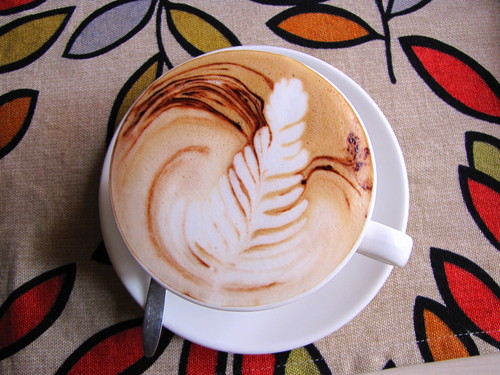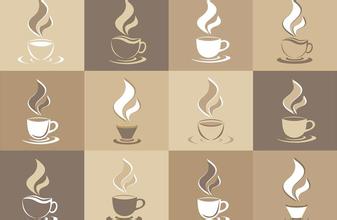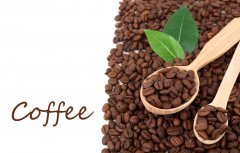Coffee and Health issues in the New York Times Coffee Research and Coffee Daily
Do decaffeinated coffee have the same benefits?
Decaffeinated coffee is not included in most studies because fewer people drink it and the data are not available. However, a small number of studies that included it have different results. In terms of cardiovascular disease, decaffeinated coffee does not seem to have the preventive effect of normal coffee; in a comprehensive analysis of stroke, it seems to have the same effect as normal coffee; the analysis of two cases of breast cancer showed that decaf coffee was as ineffective as normal coffee. Decaffeinated coffee also protects against lung cancer, but has no positive effect on Parkinson's disease. It plays a role in preventing diabetes and reducing overall mortality, but may be slightly weaker than normal coffee.
Coffee brewed in a Chemex pot
Photography | New York Times Heather Walsh
But most studies still do not have enough data to support. The results are as follows: there is little evidence of its overall potential benefits, but there is no evidence that it is harmful to health.
How much is a cup of coffee?
Almost all studies define "a cup of coffee" as an 8-ounce (about 227ml) amount. I think this is less than most people drink. A large cup of coffee at Starbucks is 16 ounces.
Does tea have the same effect?
There is almost as much literature about tea as coffee, and it will take a lot of time to study them thoroughly. But many of the studies I have read do include an analysis of tea, and I can talk about this part. Tea drinkers had a lower risk of Parkinson's disease and cognitive decline; black tea had a potential but not significant effect on diabetes, while green tea had no effect on diabetes.
However, if you are interested in tea enough, we can also discuss this drink in our column later.
Does this effect come from caffeine or other elements in coffee?
I don't know. I don't think it has the same preventive effect on every disease. I think caffeine may have a stimulant effect on the brain for many neurological problems, and the supporting argument for this hypothesis is that decaffeinated coffee does not seem to have this effect, while tea does. However, in some other diseases, the same effect is not shown in other caffeinated drinks. For example, no one thinks that drinking soda can reduce the risk of cancer. In addition, decaffeinated coffee also showed some preventive effects. So it's possible that something else is at work, but we don't know.
Does it work on high blood pressure and high cholesterol?
A randomized controlled trial of a comprehensive analysis in 2005 found that caffeine increased blood pressure, but had little effect on blood pressure when caffeine was obtained from coffee. A 2011 study found that caffeine intake raised blood pressure for at least three hours, but similarly, no significant link was found between long-term coffee consumption and high blood pressure. In a comprehensive analysis of 10 groups of randomized controlled trials and 5 groups of studies in 2012, no effect of drinking coffee on blood pressure and cholesterol was found.
As previously reported in the New York Times, two studies have shown that drinking unfiltered coffee, such as Turkish coffee, may lead to an increase in serum cholesterol and triglycerides, but when coffee is filtered through filter paper, caffeine, which causes cholesterol, is filtered out.
High blood pressure and high cholesterol need attention because it can lead to heart disease or death, and drinking coffee is beneficial in these areas, which is really important.
Some readers are dissatisfied that I didn't mention some of the adverse effects of coffee, such as nervousness and mood changes.
I would like to reiterate that the purpose of this article is not to tell people to drink coffee, as I said in my recent "Food recommendation" article, I do not think there is any value in persuading or judging other people's diet. and the evidence comes from epidemiology and is based on observations of samples. I don't want to fall into the mistake of advising people to change their eating habits without evidence from randomized controlled trials.
The significance of this article is to show that there is no evidence that coffee is harmful to the general population, there is no data to show that we drink "too much" coffee, and coffee has nothing to do with health damage-the opposite is true. Based on this, we should stop telling others to drink less or not to drink coffee, or criticize those who drink coffee, and no longer feel guilty about drinking coffee or feel the need to drink less.
That's it, unless it makes you uncomfortable. As I said before, nutritionally speaking, individual trial and error may be necessary, and some people need to avoid caffeine for medical reasons. If coffee makes you feel uncomfortable, or makes it difficult to fall asleep, or makes you less likeable-please feel free to cut back or stop drinking coffee.
But if you like it, enjoy it.
Aaron E. Carroll is a The Upshot columnist for the New York Times. Doctor of Medicine, Professor of Pediatrics, Associate Dean of Indiana University School of Medicine, Director of the Center for Health Policy and Professional Research. He received a bachelor's degree in chemistry from Amherst College, an M.D. from the University of Pennsylvania School of Medicine, and a master's degree in health services from the University of Washington.
Copyright Information:
The above articles are authorized by Xiangtou Coffee and may not be reproduced without consent.
Original translation: fragrant coffee
Fragrant Coffee WeChat account: gooddayxt
Source: new York Times, May 11, 2015
For infringement, please contact: weixin@coffeesalon.com
Contribution cooperation: tips@coffeesalon.com

Important Notice :
前街咖啡 FrontStreet Coffee has moved to new addredd:
FrontStreet Coffee Address: 315,Donghua East Road,GuangZhou
Tel:020 38364473
- Prev

Coffee gossip news coffee news
The processed raw beans will be preserved in the form of shell beans, and the water content is about 12%. Before baking, the endocarp and silver peel will be removed, and the coffee beans of the right size will be selected and roasted for 816 minutes. High-quality coffee beans + Casati coffee machine = a good cup of coffee has smelled coffee, how to drink fragrant coffee? First of all, grind the roasted coffee
- Next

Compared with the level of coffee consumption, the average British coffee market at home and abroad spends 15% of their lives in coffee shops.
According to a report by the British Broadcasting Corporation (BBC) on the 1st, market research shows that because most Britons do not know how to make their own coffee, let alone how to make cappuccino or latte, each person spends an average of 15600 pounds (about 156000 yuan) in a coffee shop. The market survey, conducted by British coffee and coffee utensils manufacturers, showed that
Related
- Unexpected! Ruixing Telunsu lattes use a smoothie machine to foam milk?!
- % Arabia's first store in Henan opens into the village?! Netizen: Thought it was P's
- Does an authentic standard mocha coffee recipe use chocolate sauce or powder? Mocha Latte/Dirty Coffee/Salty Mocha Coffee Recipe Share!
- What is the difference between Vietnam egg coffee and Norway egg coffee? Hand-brewed single product coffee filter paper filter cloth filter flat solution!
- What is the difference between sun-cured and honey-treated coffee? What are the differences in the flavor characteristics of sun-honey coffee?
- How to make Italian latte! How much milk does a standard latte use/what should the ratio of coffee to milk be?
- How to make butter American/butter latte/butter Dirty coffee? Is hand-brewed coffee good with butter?
- Is Dirty the cold version of Australian White? What is the difference between dirty coffee/decent coffee and Australian white espresso?
- Relationship between brewing time and coffee extraction parameters How to make the brewing time fall to 2 minutes?
- Got entangled?! Lucky opens a new store, Mixue Ice City, and pursues it as a neighbor!

